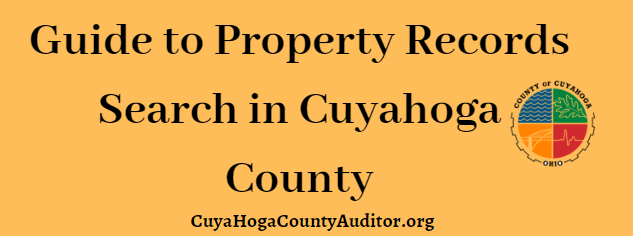Property records are essential documents that provide detailed information about real estate ownership, transactions, and history. In Cuyahoga County, Ohio, accessing property records is crucial for various purposes, including buying or selling property, conducting research, and resolving legal disputes.
Cuyahoga County Property Ownership Records
Property records encompass a wide range of information, such as ownership details, property boundaries, tax assessments, and historical sales data. These records are maintained by local government authorities and are accessible to the public.
Why Conduct a Property Records Search?
Conducting a property records search in Cuyahoga County allows individuals to gather comprehensive information about a particular property. Whether you’re a homebuyer looking to verify ownership or a developer researching potential investment opportunities, accessing property records provides valuable insights.
Where to Access Property Records in Cuyahoga County
Property records in Cuyahoga County can be accessed through various channels, including online databases provided by the county auditor’s office and in-person visits to local government offices, such as the recorder’s office or the assessor’s office.
Steps to Conduct a Property Records Search
To conduct a property records search, individuals may need to register with the online platform provided by the county auditor’s office. Once registered, users can utilize search tools and filters to narrow down their queries and retrieve relevant information.
Interpreting Property Records
Interpreting property records requires an understanding of the terminology used and the ability to identify key information, such as property boundaries, liens, and encumbrances. It’s essential to review records carefully and seek clarification if needed.
Tips for Efficient Property Records Searches
To streamline the property records search process, users can utilize filters and search criteria provided by online databases. Additionally, it’s crucial to avoid common pitfalls, such as overlooking relevant information or misinterpreting data.
Examples of Property Records Use Cases
Property records play a significant role in various real estate transactions, including buying, selling, and leasing properties. Additionally, developers rely on property records to assess the feasibility of development projects and identify potential risks.
Legal Considerations and Privacy Concerns
While property records are generally accessible to the public, certain restrictions may apply, such as access limitations for sensitive information or data protection regulations governing the handling of personal information.
Benefits of Professional Assistance
Seeking professional assistance from real estate agents, attorneys, or title companies can help individuals navigate complex property transactions and ensure compliance with legal requirements.
Common Challenges and Solutions
Challenges such as outdated or incomplete records can be addressed by cross-referencing multiple sources and verifying information with relevant authorities.
Conclusion
In conclusion, conducting a property records search in Cuyahoga County is an essential step for anyone involved in real estate transactions or research activities. By leveraging available resources and understanding how to interpret property records, individuals can make informed decisions and navigate the complexities of property ownership effectively.
Cuyahoga County Property Ownership Records – FAQs
-
What information can I find in property records?
Property records typically include details about ownership, property boundaries, tax assessments, and historical sales data.
-
Are property records always accurate?
While property records strive to maintain accuracy, discrepancies or errors may occur due to various factors. It’s essential to verify information with reliable sources.
-
Can anyone access property records?
In most cases, property records are accessible to the public. However, certain restrictions may apply to sensitive information or data privacy concerns.
-
How often are property records updated?
Property records are regularly updated to reflect changes in ownership, assessments, or other relevant information. The frequency of updates may vary depending on local regulations and administrative processes.
-
Is there a fee for accessing property records?
Some online platforms may charge a fee for accessing certain features or obtaining certified copies of documents. However, basic property record searches are often available to the public free of charge.
